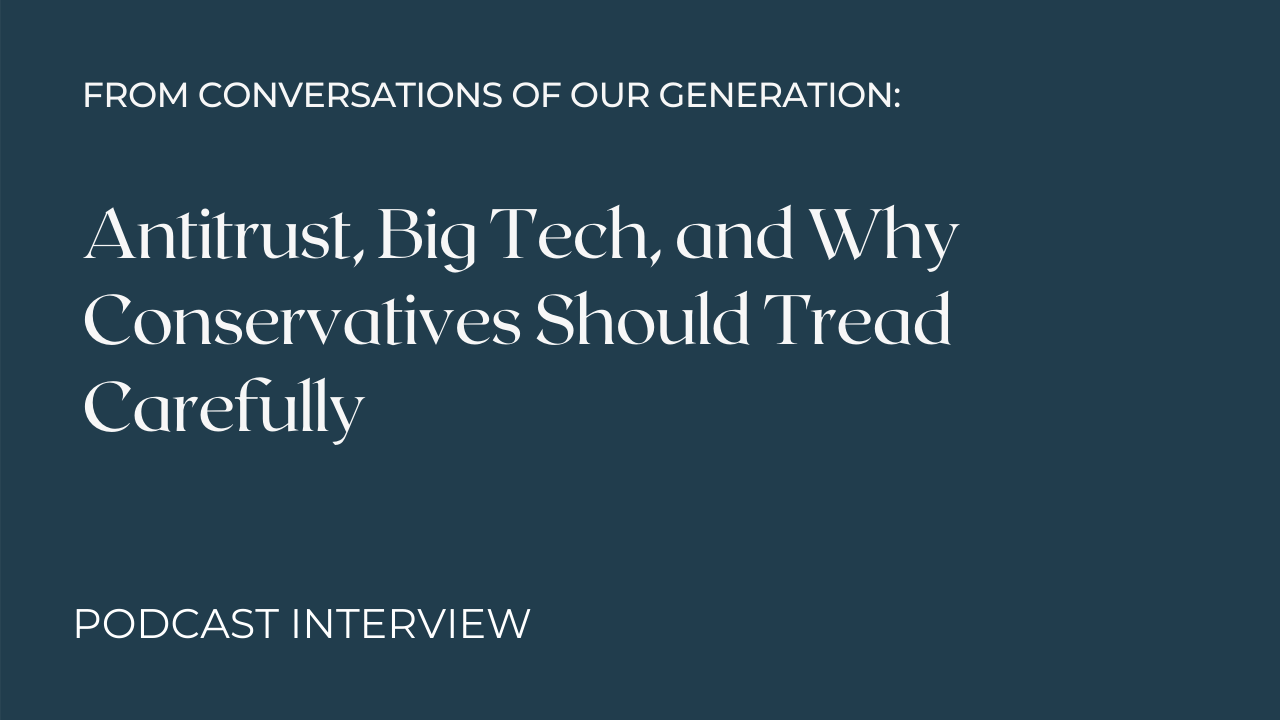
The National Security Implications of Antitrust: An Introduction

Big Tech, Antitrust, and Liberty
Recent actions by several tech companies of "deplatforming" some people have lead to a call for government to "do something." Many people are calling for antitrust legislation to break up Facebook, Twitter, Amazon and other tech companies that have a seemingly insurmountable advantage and are engaging in anti-competitive tactics. Is this a legitimate complaint?

Statement for the Record on Hearing: ‘Transforming the FTC: Legislation to Modernize Consumer Protection’
On July 1, 2021, the Federal Trade Commission (FTC), after allowing six days for public comment, voted to rescind the 2015 Statement of Enforcement Principles Regarding “Unfair Methods of Competition” (UMC) Under Section 5 of the FTC Act. On July 21, 2021, the FTC voted to rescind its bipartisan 1995 Policy Statement on Prior Approval and Prior Notice Provisions in merger cases.
Notably, both of these actions – along with other significant changes – were effected along party lines, with limited opportunity for public input, and without dialogue among the Commissioners. Today’s hearing will consider a wide array of reforms, many of which are relevant to the level of discretion and enforcement principles under FTC Act § 5 and to the broader capabilities and mandate of the Commission.

Biden's Executive Order on Competition: A Discussion
On July 9, President Biden signed the Executive Order on Promoting Competition in the American Economy, which is perhaps the most sweeping executive order in several decades, and will drastically expand the power of the federal government. The E.O. contains 72 specific actions that will impact not only tech companies, but also financial institutions, internet service providers, pharmaceutical companies, railways, airlines, biopharmaceutical innovators, drug prices, patent owners, and much more.
Our panel of antitrust experts discuss the underlying justifications for the order, the possible effects, and the implications for consumers, businesses, and regulatory agencies.
Comments In Re: Rescission of 1995 FTC Statement on Prior Approval and Prior Notice Provisions
It is troubling that the FTC will be considering a significant shift in policy as the open meeting agenda will include this sudden push to revoke the 1995 statement. Of particular concern is the rejection of the prior approval provision.
With the adoption of the 1995 statement, the Commission accepted the Hart-Scott-Rodino (HSR) Act framework as adequate for handling mergers and thereby determined that prior approval of future acquisitions by a respondent should no longer be required as a routine matter.
The rescission of the 1995 statement is another step in the direction of rejecting the HSR regime which, in the words of Peter W. Rodino, Jr on the 25th anniversary of the Act, “absolutely has transformed merger enforcement. Competition, as well as the consumer, has benefitted.”

Comments In Re: Rescission of 2015 FTC Statement on Unfair Methods of Competition
Abandoning the 2015 statement’s framework would remove important guardrails that established predictability and guidance in enforcement actions. The lack of predictability resulting from the FTC’s re-expanded discretion in invoking broad Section 5 authority on a case-by-case basis would create uncertainty for businesses of all sizes and across all industries. The Commission’s misadventure into UMC expansionism would generate unwarranted confusion, and eventually courts would have to grapple with questions of interpreting the outer boundaries of Section 5 authority that were previously cabined by the 2015 statement.

Comments to the Federal Trade Commission Concerning the July 1, 2021 Open Meeting Agenda
Ultimately, we worry that both reports support proposals that place government bureaucrats at the heart of decisions regarding the way products are designed, how firms compete, and other questions that have been traditionally left to consumers. And through the adoption of these proposals, conservatives risk playing into the regulation-happy hands of progressives.

Breaking Down the House Judiciary Antitrust Bills and Amendments
The majority has scheduled a full-committee mark-up less than two weeks after unveiling the bills and less than 48 hours after disclosing new versions to be offered as substitute amendments. The majority is selling out conservatives in order to ram their whole package through. These are serious changes to a broad area of law that deserve serious consideration. It is clear that House Democrats never intended to allow that to be the case.
In fact, they have even admitted to such strategies. For example, Chairman Cicilline told the New York Times that in the markup, he’ll take up measures with the most agreement first and worse legislation later. At least the quiet parts are sometimes said out loud.
Contrast this with the fact that this was preceded by a more than 16-month investigation, about a dozen hearings, a 450+ page report, and the fact that there have been nine months following the report’s publication. Now that the details to proposed solutions have been drafted without meaningful Republican collaboration, the committee is moving about a month after a partisan report was reported out of committee without a single GOP vote.

The Common Purposes of Intellectual Property and Antitrust
Although the compatibility of intellectual property (IP) and antitrust has been widely recognized by Congress and the Supreme Court, recent discussions of monopolies in digital markets often presents IP rights and antitrust laws as conceptually incompatible concepts. The nexus between property rights and competition is complex, but ultimately IP and antitrust share common goals of increasing market output, value, and competition. Guided by the consumer welfare standard, modern antitrust law rejects the notion that mere possession of a patent or copyright constitutes possession of anticompetitive market power and makes clear that applying for or enforcing these rights does not establish exclusionary conduct. And while patents and other forms of IP are frequently described as incentives to innovate, their disruptive, anti-monopoly effects are often overlooked. Our panel of experts discuss the nexus between patents, copyright, and competition as well as recent developments at the interface of IP and antitrust law.

Antitrust, Big Tech, and Why Conservatives Should Tread Carefully
I had the chance to sit down and speak with Ashley Baker, an expert in antitrust. We discussed antitrust and big tech, and how conservatives should fight back against tech.

Antitrust and Big Tech: Does New Technology Call for New Rules?
Recently, Senator Amy Klobuchar (D-MN) introduced a bill that would overhaul the past forty-five years of antitrust law by rewriting legal standards, changing guidelines for mergers, and expanding the government’s civil penalty authority. Additionally, the House Judiciary Committee conducted its own investigation and released a report on competition in the digital market.

Is Big Tech Too Big? A Conversation on Tech, Antitrust, and Whether Its Time to Break Up the Giants
The Cornell Federalist Society and the Adam Smith Society host Ashley Baker, Director of Public Policy at the Committee for Justice, and Joseph Malchow, founder of Publir and venture investor. Ashley and Joe discuss legislative proposals and weigh in on current debates over the proper scope and purpose of federal antitrust law.

